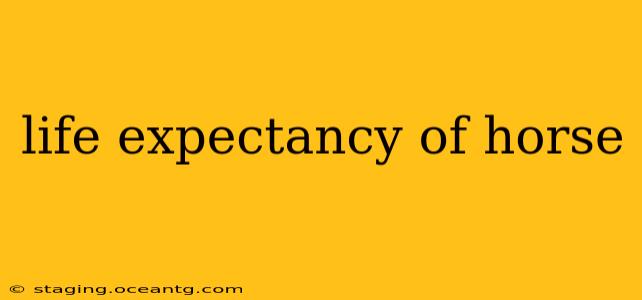The life expectancy of a horse is a complex topic, influenced by a multitude of factors. While a simple answer might seem appealing, understanding the nuances is key to appreciating these magnificent animals and their varied lifespans. This comprehensive guide will delve into the average lifespan, factors influencing longevity, and common misconceptions surrounding horse lifespans.
What is the Average Life Expectancy of a Horse?
The average lifespan of a domestic horse is generally considered to be between 25 and 30 years. However, this is just an average; many horses live significantly longer or shorter lives depending on various factors. Some breeds are naturally predisposed to longer lifespans than others, and individual health and care play a significant role. It's not uncommon to hear of horses living well into their thirties, and some even exceeding 40 years! But, sadly, some horses may unfortunately not reach their twenties due to illness, injury, or poor management.
Factors Affecting a Horse's Lifespan
Several key factors influence how long a horse lives. These factors interact in complex ways, making it difficult to predict a horse's precise lifespan.
Breed:
Certain breeds are known for their longevity. For example, some pony breeds tend to live longer than certain larger draft breeds. This isn't a hard and fast rule, but breed can be a contributing factor. Genetics play a critical role in determining overall health and disease resistance.
Genetics and Heredity:
A horse's genetic makeup significantly influences its susceptibility to various diseases and conditions. Horses with a strong family history of longevity and good health are more likely to live longer themselves. Inherited conditions can unfortunately shorten a horse's life considerably.
Nutrition and Diet:
Proper nutrition is absolutely vital for a horse's health and longevity. A balanced diet, appropriate to the horse's age, breed, work level, and overall health, is essential. Nutritional deficiencies can weaken the immune system, making the horse more susceptible to disease, and can lead to various health problems.
Healthcare and Veterinary Care:
Regular veterinary check-ups, preventative care, and prompt treatment of illnesses and injuries are crucial for extending a horse's lifespan. Early detection and management of health issues can dramatically improve the chances of a long and healthy life.
Environment and Housing:
The environment in which a horse lives plays a crucial role. Adequate shelter, clean water, appropriate pasture, and protection from extreme weather conditions contribute significantly to overall health and wellbeing.
Exercise and Workload:
While exercise is vital for a horse's physical and mental health, overexertion and inappropriate workloads can lead to injuries and premature aging. A balanced exercise program tailored to the horse's age, breed, and fitness level is essential.
Stress Levels:
Chronic stress can negatively impact a horse's immune system and overall health. Minimizing stress through appropriate management techniques is crucial for promoting longevity.
How can I tell the age of a horse?
Determining a horse's age can be done through several methods:
- Teeth: Veterinarians and experienced horse handlers can assess a horse's age by examining its teeth. The shape, wear, and emergence of different teeth provide clues about age.
- Veterinary Examination: A comprehensive veterinary examination can provide insights into the horse's overall health and offer clues regarding its age.
- Records: If available, historical records, such as breeding papers or previous veterinary records, can provide accurate information about the horse's age.
Do Miniature Horses Live Longer Than Other Horses?
While anecdotal evidence suggests that some miniature horse breeds might have longer lifespans, there's no definitive scientific research confirming this. However, their smaller size and often slower metabolisms might contribute to a longer lifespan in some instances. Individual health and care remain the most influential factors.
What are the signs of an aging horse?
As horses age, they may exhibit several signs:
- Changes in coat: The coat may become duller, thinner, or change in color.
- Weight loss or gain: Significant weight changes can be an indicator of underlying health issues.
- Dental problems: Dental issues are very common in older horses and can affect their ability to eat properly.
- Joint stiffness and lameness: Arthritis and other joint problems are common in older horses.
- Decreased energy levels: Older horses may become less energetic and less willing to participate in strenuous activities.
Regular veterinary check-ups are crucial for monitoring the health of older horses and addressing any age-related issues promptly. Careful management and appropriate care can significantly enhance the quality of life for senior horses. Understanding the factors that influence a horse’s lifespan allows for better care and a longer, healthier life for your equine companion.
